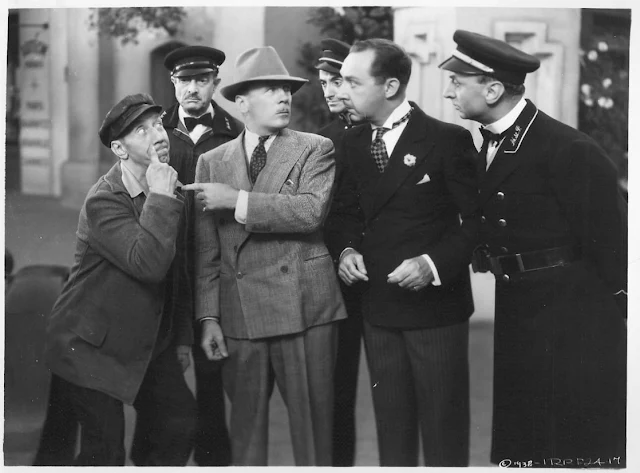 |
| Dana Andrews, Teresa Wright, Myrna Loy, Fredric March, Harold Russell, and Cathy O'Donnell in The Best Years of Our Lives |
Al Stephenson: Fredric March
Milly Stephenson: Myrna Loy
Peggy Stephenson: Teresa Wright
Fred Derry: Dana Andrews
Marie Derry: Virginia Mayo
Homer Parrish: Harold Russell
Wilma Cameron: Cathy O'Donnell
Butch Engle: Hoagy Carmichael
Hortense Derry: Gladys George
Pat Derry: Roman Bohnen
Mr. MiltonI: Ray Collins
Cliff: Steve Cochran
Director: William Wyler
Screenplay: Robert E. Sherwood
Based on a novel by MacKinlay Kantor
Cinematography: Gregg Toland
Film editing: Daniel Mandell
Music: Hugo Friedhofer
The Best Years of Our Lives is a very good movie, rich in characters and provocative incidents. It's not a great movie, but it's such a satisfying work of popular moviemaking that I'm surprised in this age of sequels and reboots, especially after the recent enthusiasm for the "Greatest Generation," no one has attempted a follow-up on the lives of its characters, taking them into the era of the Korean War, the nuclear buildup of the Soviet Union, the Cold War, McCarthyism, the civil rights struggle, and so on. Because there is something unfinished about the stories of Al, Fred, and Homer, not to mention Milly, Peggy, Marie, and Wilma, that perhaps director William Wyler and screenwriter Robert E. Sherwood couldn't possibly have foreseen in 1946. On the other hand, that's what makes
The Best Years of Our Lives such a fascinating and useful document of its times. It's anything but an antiwar film -- although Homer Parrish has been mutilated, Fred Derry suffers PTSD nightmares, and Al Stephenson is well on his way to alcoholism, the film makes no effort to suggest that the war that inflicted these injuries on them was anything but just. The one naysayer, the "America Firster" who tangles with Homer and Fred in the drugstore, gets his just deserts, even if it costs Fred his job. What wins us over most is the performances: Fredric March overacts just a touch, but it won him the best actor Oscar. Harold Russell, the non-actor who received both a supporting actor Oscar and a special award, is engagingly real. And Dana Andrews proves once again that he was one of the best of the forgotten stars of the 1950s, carrying the film through from the beginning in which he seeks a ride home to the end in which he pays a nostalgic visit to the kind of plane from which he used to drop bombs. Neither Andrews nor Myrna Loy ever received an Oscar nomination, but their work in the film exhibits the kind of acting depth that makes showier award-winners look a little silly. Loy makes the most of her part as the wryly patient spouse, Teresa Wright manages to make a role somewhat handicapped by Production Code squeamishness about extramarital affairs convincing, and Virginia Mayo once again
demonstrates her skill in "bad-girl" roles. Wyler was a director much celebrated by the industry, with a record-setting total of 12 nominations, including three wins: for this film,
Mrs. Miniver (1942), and
Ben-Hur (1959). He's not so much admired by those of us who cling to the idea that a director should provide a central consciousness in his films, being regarded as an impersonal technician. But
Best Years is a deeply personal film for Wyler, who had just spent the war serving in the army air force, flying dangerous missions over Germany to make documentary films, during which he suffered serious hearing loss that threatened his postwar directing career. His experiences inform the film, especially the character of Fred Derry. In addition to the best picture Oscar and the ones for Wyler, March, and Russell,
Best Years also won for Sherwood's screenplay, Daniel Mandell's film editing, and for Hugo Friedhofer's score. The last, I think, is questionable: Friedhofer seems determined to make sure we don't miss the emotional content of any scene, almost "mickey-mousing" the feelings of the characters with his music. It feels intrusive in some of the film's best moments, such as the beautifully staged reunion of Al and Milly, or the scene in which Homer, fearful that the hooks that replace his hands have destroyed his engagement to Wilma, invites her up to his room to help him get ready for bed, demonstrating the harness that holds his prostheses in place. It's a moment with an oddly erotic tension that doesn't need Friedhofer's strings to tell us what the characters are feeling.













